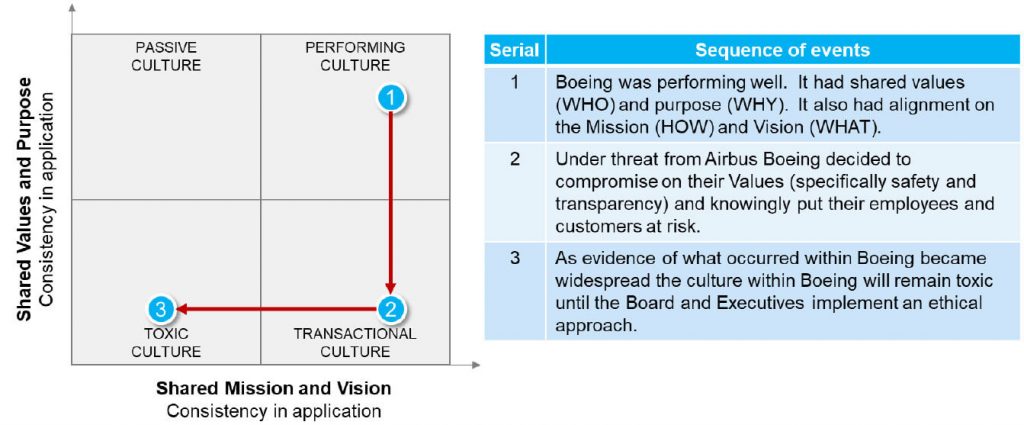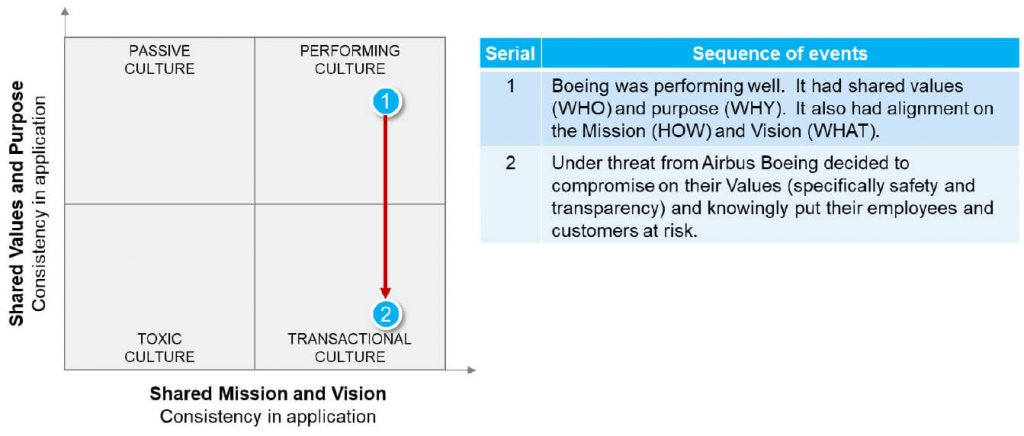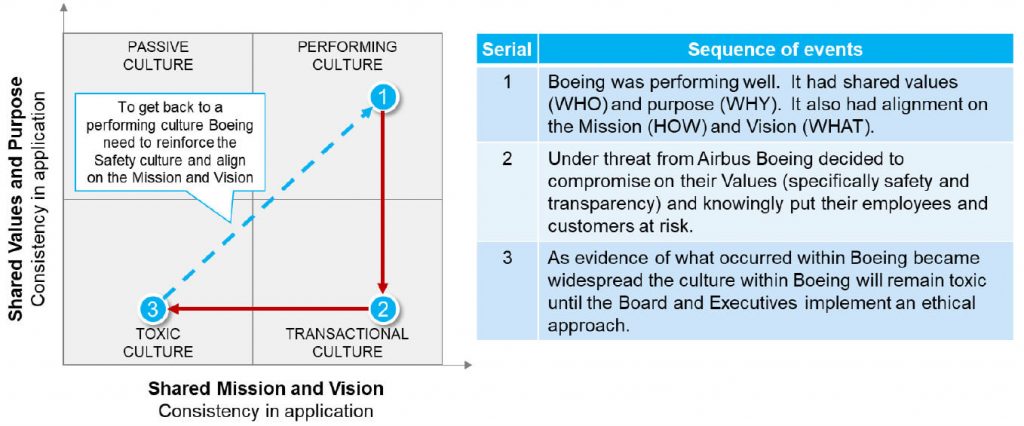On 29 October 2018 a Lion Air flight crashed into the Java Sea 12 minutes after takeoff. All 189 passengers and crew travelling in the Boeing 737 MAX 8 perished. On 10 March 2019 another Boeing 737 MAX 8, this time operated by Ethiopian Airlines, crashed shortly after takeoff from Addis Ababa. This crash also killed every one of the 157 passengers on board.
346 people dead in fewer than five months. And all MAX 8s grounded until further notice. Many would assume the issue was a technical one; however, when viewed through the lens of the Rekon Culture Model™ it becomes clear this is a leadership and cultural issue. Although the cause of the accident in both instances was a technical flaw, it was a known flaw. The issue was not that the flaw existed, but rather that the people involved decided to compromise their values for results, in this case the safety of its employees and customers to compete with Airbus.
The fatal technical flaw
At the centre of the Boeing tragedies lies a faulty angle of attack (AoA) sensor – a sensor that measures the angle between the wings and the airflow. Investigations soon established that an AoA sensor was sending erroneous information to the MCAS software system of the Max 8 during both fatal flights. The AoA was mistakenly warning the software about an imminent stall and the software, in its attempt to save the plane, sent it into a dive profile that would prove to be fatal.
Boeing developed the software as part of a rapid upgrade on the highly popular 737 in order to compete with Airbus’s fuel-efficient new A320neo, which launched in 2010. Competing with the neo required Boeing to fix bigger engines to a frame not originally built for them. The placement of the engines caused the nose of the plane to lift more than it should, but Boeing “solved” the problem by developing the MCAS software to counter the lift – which it did – fatally – when the sensor malfunctioned.
Reputational damage
Boeing is widely accused of putting profit above passenger safety in what some term its “reckless pursuit of profits.” Viewed through the lens of the Rekon Culture Model™ they went from a Performing culture to a transactional one i.e. one where results are prioritized over values.
Initially Boeing had a high-performing culture – one where they had Shared Values (WHO) and Purpose (WHY) as well as shared Mission (HOW) and Vision (WHAT). Faced with a need to compete with Airbus they compromised their values, specifically their safety standards, to sell more aircraft. We can only speculate, but indications are this created a transactional culture within Boeing. There were two camps within Boeing: those who agreed with the approach and those who didn’t.

Commentators have rightly condemned Boeing for allowing its fierce competition with Airbus to inform decision-making instead of looking after the safety of the people who have travelled in various iterations of this bestseller plane since 1967.
Once the 737 Max started having accidents it was clear there was a problem. There were those within Boeing who wanted change. It is very likely this created an internal struggle as a toxic culture manifested. An employee base, comprising of people who historically have been very proud of their safety and High-Performance culture, felt betrayed by their leadership.

The ‘heads in the sand’ approach by the Executive leadership was evident on 29 April 2019 when facing probing questions at the annual shareholders’ meeting, CEO Dennis Muilenberg denied that Boeing had done anything wrong. He said, “We have gone back and confirmed again as we do the safety analysis, the engineering analysis, that we followed exactly the steps in our design and certification processes that consistently produce safe airplanes.” This is something that is challenged by experts who believe that Boeing compromised their mission (HOW they design and operate) making the relationship between Boeing and its customers and employees toxic.
The right question
There are indications Boeing is now looking at its performance more critically. The Washington Post article published on 3 May 2019, quotes another board member, Lawrence Kellner as saying, “We should review our process, which we are. I think everyone should look back and say, ‘What can we do to strengthen this process?’”
The process unfortunately is only one part of the question. The question should be: “How do we ensure something like this never happens again?” This is something the Rekon Culture Model™ helps companies to answer. Using this framework as a lens we can see that Boeing needs to align and consistently apply a shared set of values, purpose, mission and vision. Only when it does this will it be able to become a High-Performance organisation again.

Creating a Values driven culture
In Boeing’s case, they should ask some hard questions of themselves: Were the strategic decisions we made to compete against Airbus in line with the stated Values of our company? Are our stated and actual Values one and the same? Did we go too far in our attempt to keep the 737 competitive – did we compromise Values for results? When it became clear that the MAX8 had a technical glitch, did we act in line with our Values and Purpose?
All to often Values are proudly displayed in organisations as you walk in the door; however, they are also often the first thing to be compromised in the chase for revenue and growth. The Rekon Culture Model™ effectively demonstrates why compromising Values is a sure-fire way to create a toxic culture. Had Boeing known this beforehand one wonders if they would have been so keen to compromise their values for results.
SOURCES:
‘Safety was just a given’: Inside Boeing’s boardroom amid the 737 Max crisis – Douglas MacMillan – 5 May 2019 Washington Post
Boeing’s Grounded 737 Max: The Story So Far – Kyunghee Park – Bloomberg – 7 May 2019
The many human errors that bought down the Boeing 737 Max – Darryl Campbell -2 May 2019
Boeing did not disclose 737 MAX alert issue to FAA for 13 months – Tracy Rucinski and David Shepardson, Reuters – 6 May 2019

